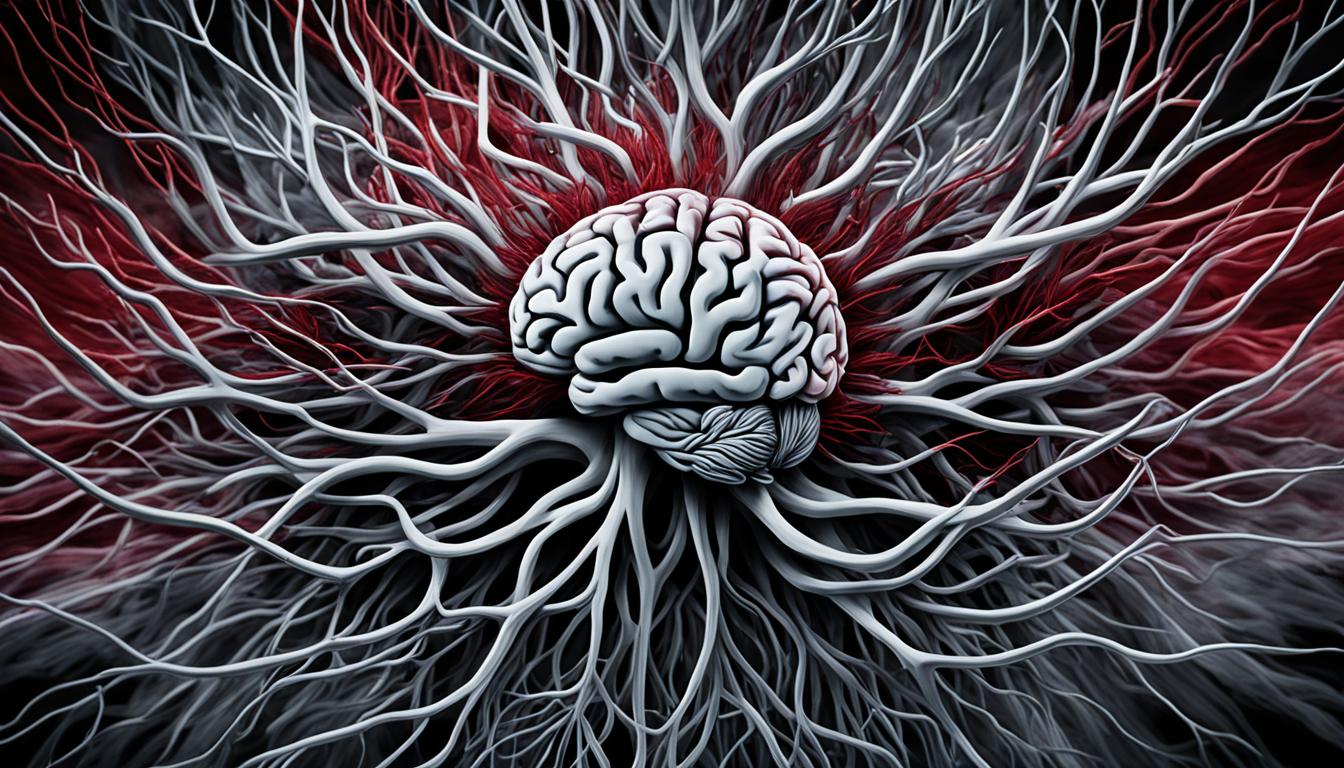Brain metastases happen when cancer spreads to the brain from another part of the body. The main cancers that do this are lung, breast, colon, kidney, and melanoma. Symptoms of these brain tumors can include headaches, mental changes, seizures, and weakness or numbness in a limb.
Doctors usually find brain metastases using an MRI or CT scan. There are several ways to treat these tumors. This can include surgery, radiation, chemo, or a mix of all of these. Stem cell therapy is also an option that doctors are exploring.
Key Takeaways:
- Brain metastases occur when cancer cells spread from their original site to the brain.
- The most common types of cancer that cause brain metastases are lung, breast, colon, kidney, and melanoma.
- Symptoms of brain metastases include headaches, mental changes, seizures, and weakness or numbness on one side of the body.
- Diagnosis is typically done through imaging scans like MRI or CT scans.
- Treatment options for brain metastases include surgery, radiation therapy, chemotherapy, immunotherapy, and stem cell therapy.
Symptoms and Causes of Brain Metastases
The symptoms of brain metastases change depending on where, how big, and how fast tumors grow. Signs often include bad headaches, throwing up, memory loss, seizures, and feeling weak or numb on one side.
Cancer spreads to the brain when cells move from their first spot to the brain. This can happen through blood or the fluid system, where they then grow into tumors.
While any cancer can reach the brain, lung, breast, colon, kidney cancer, and melanoma often do so.
Common Symptoms of Brain Metastases
- Headaches: Bad headaches that don’t stop, often with other issues.
- Vomiting or Nausea: Sick feelings or throwing up without a clear reason.
- Memory Problems: Trouble with memory or thinking straight, leading to confusion.
- Seizures: Spasms or shakes that may cause blackouts sometimes.
- Weakness or Numbness: Feeling weak or like a part of your body is asleep, especially on one side.
Anyone with these signs should see a doctor for the right tests and care.
Diagnosis and Treatment Options for Brain Metastases
Doctors usually find brain metastases through scans like MRI or CT. These scans can show if there are tumors in the brain. They help doctors see where the tumors are, how big they are, and how many there are. This information is crucial for planning the right treatment for each patient.
After the diagnosis, different treatments can help with brain metastases. The treatment chosen depends on the tumor’s size and place, how far the disease has spread, and the patient’s health. Options include surgery, radiation, chemotherapy, and drugs that boost the body’s defenses against cancer. Sometimes, doctors suggest a mix of treatments for the best results.
Every treatment can help but also can cause side effects. Talk about these effects with your healthcare team. This ensures you understand what to expect. Apart from mainstream treatments, doctors might use targeted therapy or palliative care. These are special treatments that focus on certain symptoms or patient needs. Stem cell therapy is a new treatment that might help by fixing the blood-brain barrier and fighting inflammation. This could slow down the tumor’s growth in the brain.
FAQ
Q: What are the symptoms of brain metastases?
A: Brain metastases make people feel different based on tumor location, size, and how fast they grow. You might face headaches, memory trouble, and even seizures. Some may also experience weakness or numbness on one side of their body.
Q: What causes brain metastases?
A: Tumors in the brain come from cancer cells that have spread from somewhere else in the body. They could move through the blood or lymph system. Lung, breast, kidney, colon cancers, and melanoma tend to spread to the brain.
Q: How are brain metastases diagnosed?
A: Doctors use imaging scans like MRI or CT to spot brain tumors. These scans show if there are hidden tumors in the brain.
Q: What are the treatment options for brain metastases?
A: Treatment may include surgery, radiation, or drugs like chemotherapy. Immunotherapy can also help. The best treatment depends on tumor size and location, overall health, and how far the condition has spread.
Q: Are there any advanced treatment options for brain metastases?
A: Stem cell therapy is a new hope for treating brain metastases. It works by fixing the blood-brain barrier and reducing the growth of tumors in the brain.

